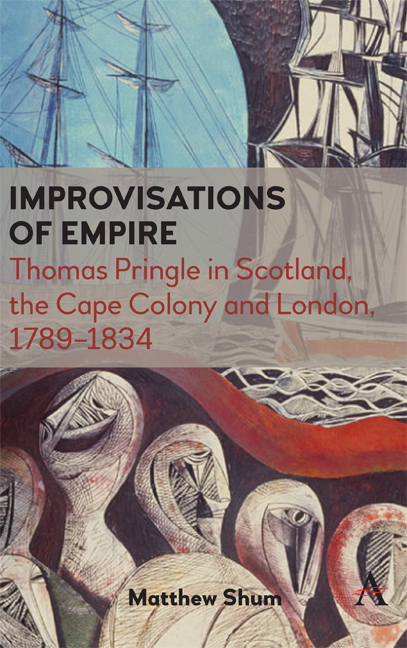Summary
Our first passage expresses already familiar convictions. I quote it as a benchmark against which to measure the deviations that follow. Here is Pringle in full evangelical force in or around 1834:
The Native Tribes, in short, are ready to throw themselves into our arms. Let us open our arms cordially to embrace them as MEN and as BROTHERS. Let us enter upon a new and nobler career of conquest. Let us subdue savage Africa by JUSTICE, by KINDNESS, by the talisman of CHRISTIAN TRUTH. Let us thus go forth, in the name and under the blessing of God, gradually to extend the moral influence, and, if it be thought desirable, the territorial boundary also of our colony, until it shall become an empire— embracing Southern Africa from the Keisi and the Gareep to Mocambique and Cape Negro— and to which, peradventure, in after days, even the equator shall prove no ultimate limit. (1966, 321)
The capitalization, the italics: there is even something typographically desperate in this bid to fashion empire into benign ethical subdual, which again suggests that Pringle might have been aware that these exorbitant expectations would not come to pass. His reference to Christianity as a “talisman” (“charm, amulet, thing supposed capable of working wonders” (Oxford English Dictionary)) casts religion itself as an apotropaic object or spell with which to “subdue” the “savage,” as though empire proceeds by a magical fetishism, thus mirroring the alleged primitivism of the colonized. When we add to this the envisaging of a divinely sanctioned expansion of “moral influence” and “territorial boundar[ies]” as the evangelical empire presses northward through the continent, we are fully immersed in an imperial imaginary that seemingly knows no bounds. This triumphalist narrative is, however, intersected— even cancelled— by other narratives, which tell different stories of empire and the imperial project. Just as the evangelical fabulations of Pringle's later poetry were on occasion interrupted by a poetry of bleak directness, so too in the Narrative there are sections that read very differently from these evangelical allocutions. A number of such passages could be cited, but the one to which I shall turn is particularly compelling since it must confront that most intractable of colonial problems, one whose legacy still haunts the present: the extermination of the San.
- Type
- Chapter
- Information
- Improvisations of EmpireThomas Pringle in Scotland, the Cape Colony and London, 1789–1834, pp. 199 - 212Publisher: Anthem PressPrint publication year: 2020

